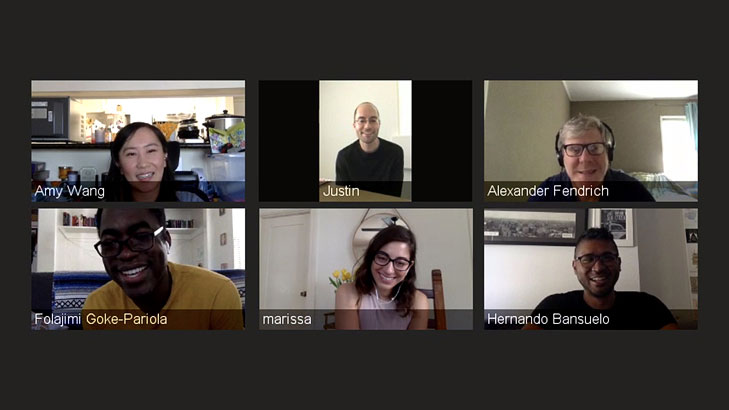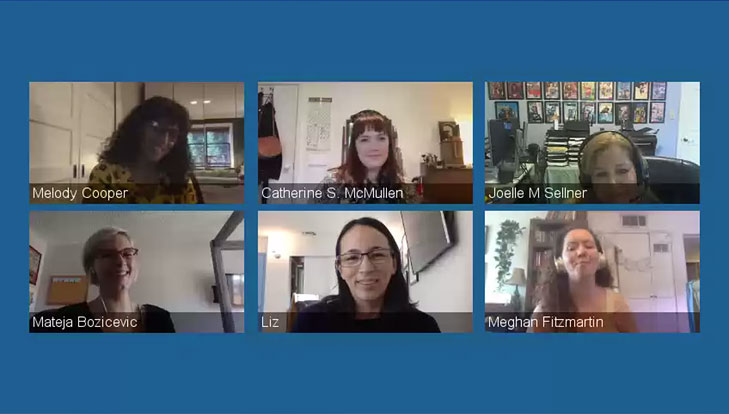Connect
Mentorship Program Anchors New Members in Uncertain Times
The Guild’s new member mentorship program gives new writers practical guidance and hope.
Mentorship is a way for seasoned writers to share their knowledge and experience and help new Guild members become more successful professionals. In a world turned upside down by COVID-19, mentor groups have continued to meet virtually and provide added support for new members.
New Guild members often feel a sense of accomplishment and excitement upon joining. It’s a big step forward in their writing career. But soon follow questions about how to build a thriving career, and this is especially true during a global pandemic.
The WGAW New Member Mentor Program helps new members find answers to those questions by putting them in small groups with successful and experienced television/streaming or screenwriters. Over the course of a year, these groups meet regularly, and mentees can communicate with their mentors directly if they have specific questions or concerns.

A screen capture of Justin Malin's mentor group.
For screenwriter and mentor Justin Malen (Office Christmas Party), career advice sometimes comes from understanding his own mistakes. “I really liked the idea that my mistakes, as well as my good decisions, could be valuable to new members,” Malen said. “That my screw-ups could prevent them from screwing up. I think it makes me regret them less.”
“There's a lot about this business that I am still not an expert at, but I liked the idea of being a sounding board and a more experienced voice for new members,” said TV writer and mentor Liz Phang (90210, The Strain). “I didn't take advantage of any WGA mentorship opportunities when I was a new member, which I really regret.”
Phang is mentor to an all-female new members group, including Mateja Božičević (Carnival Row), Joelle Sellner (Paris, Wine & Romance), C.S. McMullen (Bloom) (who is quarantining in her hometown of Melbourne, Australia), and Melody Cooper (The Sound of Darkness).
"I’ve always found the business side of writing to be challenging,” said Sellner. “I was an advertising copywriter before I got my first writing job so there are still things I find confusing. How do I get an agent in this environment? Do I even need one? I wrote a pilot—what now? It’s so valuable to get advice from someone who has successfully navigated the business and politics of writing.”
And while everyone is currently working from home, Zoom meetings have become the new norm—not that everyone is a fan of the new norm.
“Zoom is honestly not my favorite thing,” Phang pointed out. “It’s sort of in the ‘uncanny valley’ of social interaction, so I'm hoping it won't be long until my group can meet in, say, someone's backyard at safe distances from each other. And eventually a restaurant! Until then, Zoom is better than nothing.”

A screen capture of Liz Phang's mentor group.
In times like these, having access to mentorship can be especially grounding for new members. “It’s easy to fall into a sort of despair and worry about what the future holds with the pandemic looming over you,” said Božičević. “But the Guild and mentorship program helped me realize we are all in this together, equally.”
“Part of what has been so important during quarantine is having a sense of some normalcy, as well as staying connected to other humans, that aren't my cat,” McMullen said. “Having the mentoring sessions and the Guild events has been so lovely, and as someone that is often overseas, I do hope that some of the virtual events continue in some form.”
“I think the mentorship program can be particularly effective for under-represented writers who might already feel marginalized due to gender, race, ethnicity, orientation,” Cooper said. “The problems in our industry have not gone away with the pandemic, but there's a wonderful opportunity for all of us to really see each other, see the abundant talent in us all, and to work together to come through this stronger and in a better place than before, and not losing ground on any of the initiatives that have paved the way for equitable hiring and pay.”
As Phang and Malen note, working during a global pandemic has evened the playing field for mentors and mentees in some ways, as all writers are undergoing similarly new and difficult experiences.
“It's hard because I wish I had great answers for all of their questions, and I'm experiencing many of these issues for the first time, too,” Malen explained. “But I think my mentees have at least found it somewhat comforting that veterans and new members are all facing something new.”
“It's tough because I, as the mentor, have no more experience working during a pandemic than my mentees do,” Phang added. “So, I'm hoping we can all give each other help and support. It's new to all of us.”
